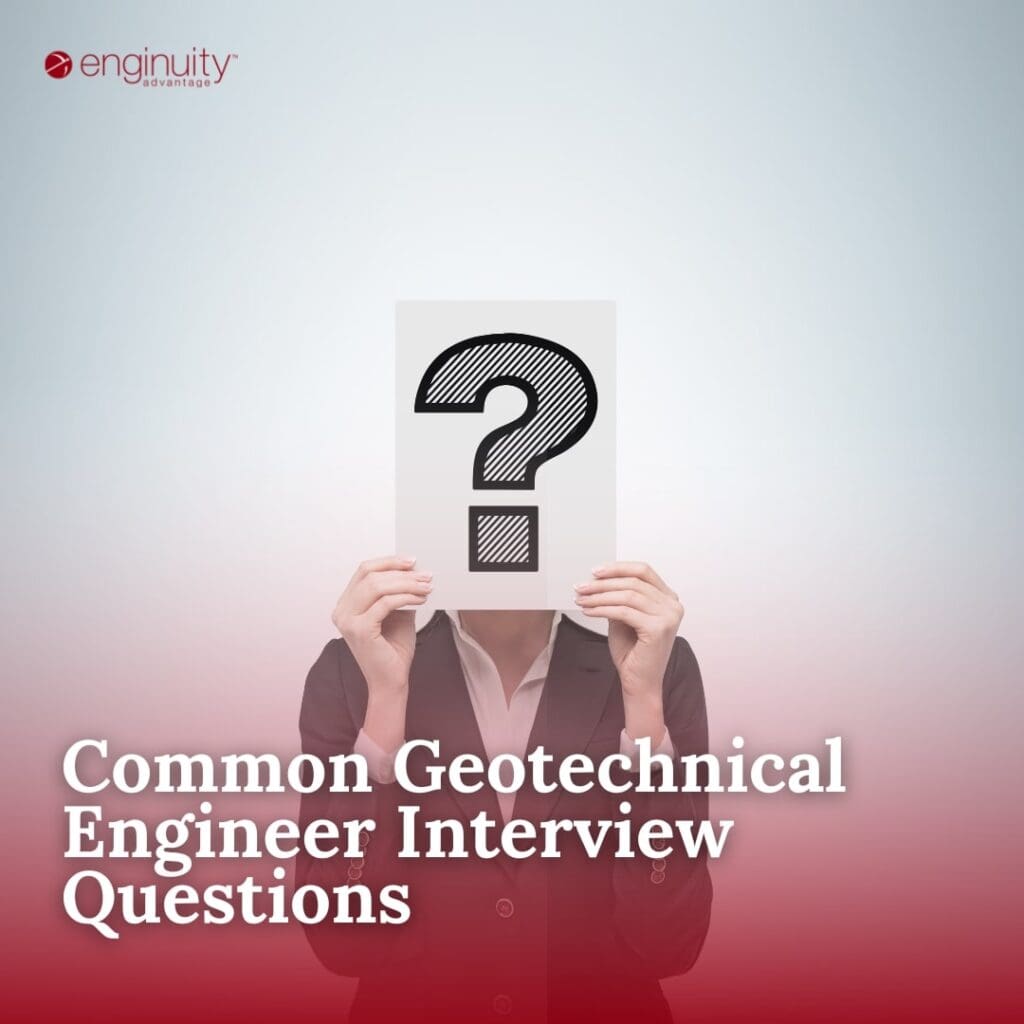Common Geotechnical Engineer Interview Questions

So, you’re stepping into the thrilling world of geotechnics? First off, a huge shout-out to you! Tackling the mysteries of the Earth’s beneath-the-surface intricacies is no small feat, and we totally get the adrenaline rush that comes with it. But let’s pause the excitement for a sec. Got an interview lined up in the geotechnical domain? That’s the real challenge and you’ll want to be as prepared as possible.
Geotechnical engineering is a niche where every grain of knowledge counts. The industry, steadily growing at an impressive rate of around 5.2% annually, means competition is hotter than Earth’s inner core. With companies seeking the crème de la crème, interviews have become their own kind of exploration – delving deep into the candidate’s knowledge, experience, and passion. Whether you’re fresh out of college or have been grinding in the field (sometimes literally) for years, a well-prepped interview can make all the difference.
So, what should you anticipate? What questions might pop up to test your geotechnical mettle? Fear not; we’ve sifted through the layers (geological pun absolutely intended) to bring you the must-knows. Strap in, folks; it’s time to drill down!
The Foundations First: Basics
Before we jump into the deep end, let’s solidify the basics. Remember, geotechnical engineering is as much about the broad strokes as it is about the details. Employers often start with these foundational questions to gauge how well you’ve grasped your undergraduate (or perhaps even high school) concepts. Think of this section as your first excavation pit – the preliminary spot where you can start impressing!
- What is geotechnical engineering, and how does it differ from civil engineering? This one might sound elementary, but it’s crucial. It’s not just about the textbook definition; interviewers are keen on knowing your perspective about the domain.
- Describe the Mohr-Coulomb failure criterion. Fundamental, yes, but you’d be surprised how many people fumble on this one. Make sure you understand the underlying principles.
- What factors influence soil compaction? Soil, in its various forms and states, is central to geotechnics. Understanding what influences its behavior is paramount.
- Can you explain the importance of Atterberg limits? Don’t just define them; delve into why they matter in real-world applications.
- What are the main soil types, and how do they differ in terms of properties and challenges? This one’s a broad canvas. Paint a picture that showcases your holistic grasp over the topic.
- Why do we conduct a plate load test? Real-world applications of theoretical knowledge are essential, and this is a great example.
- Describe the differences between cohesion and adhesion in geotechnical engineering. It’s the nuances like these that can set you apart from other candidates.
These basic questions, while seemingly elementary, lay the groundwork (pun intended) for your entire interview. Get these right, and you’re on a steady path.
The Nitty-Gritty: Technical Queries
Alright, so you’ve aced the basics, but now it’s time to dive into the core of the profession — the complex, the intricate, and the fascinatingly technical. Geotechnical engineering is all about merging academic know-how with on-site practicality, and these questions are designed to explore your depth in this field.
- How do you interpret and analyze a soil boring log? This is not just about reading data. Interviewers are looking for your ability to infer, predict, and make informed decisions based on that log.
- Describe the methods you’ve used for slope stability analysis. Here, they’re not only gauging your knowledge but also your hands-on experience with real projects.
- What is the role of pore water pressure in soil mechanics? A deep dive into this topic reveals how hydrogeology and soil mechanics often go hand in hand in geotechnical studies.
- Discuss the various ground improvement techniques you’re familiar with. The answer to this question can showcase your proactive approach to problem-solving and adapting to diverse ground realities.
- How do you determine the modulus of elasticity of soil? This leans more towards the academic side but is crucial in understanding how you approach soil as a structural material.
It’s these technical nitty-gritties that will truly showcase your mettle. When preparing for this section, lean into your past projects, real-world experiences, and even challenges you’ve faced. It’s one thing to know the theory; it’s another to apply it seamlessly in practice.
The Challenge Zone: Scenario-based
Now, we’re moving into the realm of the hypothetical, but trust me, these are no less real! Scenario-based questions test not just what you know, but how you think, adapt, and act on your feet. It’s a showcase of your problem-solving skills, your creativity, and your ability to make decisions under pressure. Interviewers often lean on these queries to gauge how you might handle real-world challenges. Here’s a taste of what you might encounter:
- You’re tasked with constructing a foundation for a skyscraper in a marshy area. How would you approach this? This one throws a curveball in terms of terrain, pushing you to consider ground stabilization methods and advanced foundational techniques.
- Imagine you’re in the middle of a project, and sudden weather changes lead to unexpected soil erosion. What’s your immediate course of action? Adverse weather conditions are unpredictable but inevitable, so having a contingency plan is essential.
- A client wants to convert an old quarry into a recreational area. How would you ensure the ground’s stability and safety? Repurposing sites is a common task for geotechnical engineers. Your approach can demonstrate innovation and environmental consciousness.
- While working on a project, you come across an underground water source not previously detected. How does this affect your plan, and how do you adapt? Natural surprises are a part of the job, and this question aims to see how you handle unforeseen challenges.
- During a tunnel construction, you notice signs of impending land subsidence. How do you handle this situation to ensure the safety of your team and the integrity of the project? Safety first! Your response will indicate your commitment to team welfare and project success.
As you tackle these scenarios, remember, there might not always be a ‘right’ answer. Often, it’s your thought process, approach, and rationale that interviewers are keen to understand.
The Future Front: Trends & Innovations
The geotechnical engineering world isn’t static; it’s evolving rapidly as we face new environmental challenges and benefit from technological advancements. Staying updated on the latest trends and innovations isn’t just good practice—it can set you apart in a job interview. Here’s a dive into some leading-edge developments you might be quizzed on and why they’re reshaping the industry’s landscape:
- 3D Ground Models: With advancements in Geographic Information Systems (GIS) and other visualization tools, creating intricate three-dimensional ground models is becoming a norm. How would you integrate these in your analyses and design processes?
- Sustainable Geotechnics: As the world grapples with climate change, sustainable practices in geotechnics are gaining traction. What are your thoughts on the role of geotechnical engineering in the global sustainability movement? And how do you envision integrating green solutions into your projects?
- Digital Twins: This is about creating a high-definition digital replica of physical geotechnical assets. Familiar with the concept? How might you harness the power of digital twins in overseeing complex geotechnical projects?
- Remote Sensing Technologies: With drones and satellite technology, remote sensing is changing how geotechnical surveys are conducted. How do you see this impacting the accuracy and efficiency of geotechnical analyses?
- Ground Improvement Techniques: New methods like microbial-induced calcite precipitation (MICP) are emerging. How do you view the role of biology and chemistry in future ground stabilization endeavors?
- Artificial Intelligence & Machine Learning: Predictive analytics, powered by AI, is making waves in soil behavior predictions and risk assessments. Can you discuss any experiences or perspectives on AI-driven solutions in geotechnical projects?
Prepping for this section is like getting a sneak peek into the future of geotechnics. As you familiarize yourself with these topics, remember that interviewers aren’t always looking for textbook answers.
Digging Deeper: Personal Growth & Ambitions
The technical side of an interview, while crucial, only paints half the picture. Geotechnical firms are also deeply interested in the person behind the resume, your ambitions, and how you envision your growth in the industry. The personal growth and ambitions section can sometimes be the most telling, as it showcases your drive, passion, and long-term vision. Here are some themes and questions that dive into this personal dimension:
- Your Why: Often, interviewers are keen on understanding your motivation. Why did you choose geotechnical engineering, and what excites you about it?
- Long-term Vision: Where do you see yourself in 5 or 10 years within the geotechnical world?
- Continuous Learning: The geotechnical landscape is ever-evolving. How do you ensure you’re always learning and staying updated?
- Mentorship and Leadership: Do you believe in mentorship? Have you had any mentors in the past? Conversely, how do you see yourself guiding newcomers in the future?
- Personal Milestones: Are there any personal or professional milestones you’re particularly proud of?
- Work-Life Integration: Geotechnical projects can sometimes be demanding. How do you balance your professional and personal life?
- Collaboration and Team Dynamics: How do you see yourself fitting into a team?
- Handling Failures: Everyone faces setbacks. Can you discuss a time you faced a significant challenge or failure in your career?
- Professional Networking: How do you view the role of networking in your professional growth?
- Contribution to the Field: Beyond just a job, how do you envision contributing to the broader geotechnical community?
- Value Alignment: How do your personal values align with the ethos of the geotechnical engineering world?
Diving into these introspective questions not only helps interviewers get to know you better but also offers you a moment of self-reflection. It’s an opportunity to realign with your goals, passions, and the larger purpose you see in your geotechnical journey. So, as you prepare, don’t just think of the right answers, but also engage in genuine self-discovery.
The geotechnical realm is buzzing with innovation, and we’ve got the perfect spots for you to make your mark. With a range of open positions tailored for talents like yours, Enginuity Advantage is where your skills meet opportunity. Why wait to be asked the questions when you can be part of the solutions?
Unlock Dream Careers & Elite Talent: Just One Click Away!


